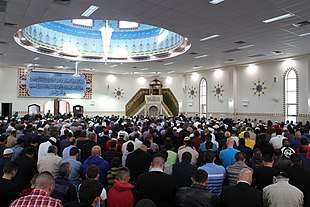Ameer Ali (academic)
Ameer Ali is the former President of the Australian Federation of Islamic Councils, an umbrella group for various Islamic groups or councils in Australia. In 2006, he was the chairman of the Australian Muslim Community Reference Group, which was an advisory body to the federal government from mid-2005 to mid-2006.[1]
| Part of a series on |
| Islam in Australia |
|---|
 |
| History |
|
| Mosques |
| Organisations |
| Islamic organisations in Australia |
| Groups |
|
| Events |
| National Mosque Open Day |
| People |
|
Ali was educated at the University of Ceylon in Sri Lanka, the London School of Economics, and received a doctorate in economics from the University of Western Australia in 1980. He has taught economics at the University of Ceylon, Murdoch University, the University of Brunei and the University of Western Australia.
In 2005, Ali said that governments should, "rid the community of radical elements" and also prevent radical speakers coming to Australia. And further, the Muslim community needs to consider what is being taught to its young people.[2]
In 2015, Ali called on religious leaders to oppose the Islamic State as, "I haven't heard so far any single imam in this country that has named IS and condemned it."[3]
Publications
Journal articles
- Ali, A., (2011), The Sri Lankan ethnic morass and China-India geopolitical manoeuvres, Economic & Political Weekly, 46, 34, pages 39 – 45.
- Ali, A., (2009), Kattankudy in Eastern Sri Lanka: A Mullah-Merchant Urban Complex Caught between Islamist Factionalism and Ethno-Nationalisms, Journal of Muslim Minority Affairs, 29, 2, pages 183 - 194.
- Ali, A., (2008), Globalization, Discontent and Islam: Thesis, Antithesis and Synthesis?,Islam and the Modern Age, 38, 2, pages 37 – 54.
- Ali, A., (2007), The Closing of the Muslim Mind,Journal of Muslim Minority Affairs, 27, 3, pages 443 - 453.
- Thompson, H., Ali, A., (1999), The Schumpeterian Gap and Muslim Economic Thought,Journal of Interdisciplinary Economics, 10, 1, pages 31 – 49.
- Ali, A., (1997), Brunei Darussalem: An Oily Economy in Search of an Alternative Path,Asian Profile, 25, pages 281 - 301.
- Ali, A., (1997), The Muslim Factor in Sri Lankan Ethnic Crisis,Journal of Muslim Minority Affairs, 17, pages 253 - 267.
Books
- From Penury to Plenty: Development of Oil Rich Brunei, 1906 to Present, Murdoch University, Department of Economics Research Monograph Series 2, 1996.
- Revolutionary Thoughts: Essays and Poem from Abdul Cader Labbe (in Tamil), (ed.), Colombo: Sri Lanka, 2011.
References
- "Muslim Community Reference Group". Department of Immigration and Multicultural Affairs, Australia. Archived from the original on 18 September 2006. Retrieved 2006-10-04.
- Das, Sushi (28 July 2005). "Between two worlds". The Age. Archived from the original on 3 March 2016. Retrieved 3 April 2015.
- Weber, David (21 February 2015). "Islamic State: Perth university student Muhammed Sheglabo joins fighters in Middle East". Yahoo News. Archived from the original on 9 March 2015. Retrieved 3 April 2015.
External links
- Biography - University of Western Australia School of Economics and Commerce
- Biography - conference participants at the University of Melbourne